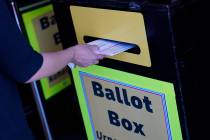Harming minority law students
The U.S. Commission on Civil Rights -- a nonpartisan agency charged with monitoring federal civil rights enforcement -- Tuesday released a report titled Affirmative Action in American Law Schools.
The study evaluates the use of racial preferences in American law school admissions, and reaches pretty much the same conclusions as UCLA law professor Richard Sander, who in a 2004 article in the Stanford Law Review estimated that racial preferences in American law school admissions have actually produced fewer -- not more, but 7.9 percent fewer -- black attorneys than would have graduated under a color-blind policy.
Professor Sander then explained why.
If a top-notch law school -- Harvard Law, say -- wants to increase the racial "diversity" of its graduating class to include more blacks, it will start out by admitting every black applicant who meets its academic standards, of course.
But what if that's not enough to meet the school's quota, or "goal"? The school will then "reach down" and offer admission to applicants from the next lower academic tier -- students who might have finished law school and gotten their degree at a middle-rank school where things proceed at a slower pace, but who find themselves out of their depth and flunk out at Harvard.
Meantime, according to professor Sander's "mismatch thesis," law schools in the next lower academic tier, deprived of the suitable applicants who were wooed away by Harvard, have to reach down even further into the ranks of the academically unprepared to meet their own quota or "goal" for minority students. These mid-tier law schools thus welcome students whose subsequent failure could have been easily predicted by an objective reading of their academic scores and grades. All with the best of intentions, of course.
It's important to note that this dynamic can harm non-minority students also. Students -- regardless of race -- "who attend school where their academic credentials are substantially below those of their fellow students tend to perform poorly," noted Gail Heriot in a Wall Street Journal commentary this week.
Tuesday, the Civil Rights Commission admonished the American Bar Association for adopting a "diversity" standard that tacitly prods law schools to use racial preferences in student admissions.
And why?
Chairman Gerald A. Reynolds commented, "Race-based admissions have been found to harm minority law students by setting them up for failure. Law schools that continue to use racial preferences despite this evidence should at least disclose the risks of academic mismatch to minority student applicants. ... A true civil rights strategy would focus on these students much earlier in their educational development, rather than providing them with inadequate training and then using preferential treatment to admit them into schools at which they are likely to fail."
Hard statistics confirm the way affirmative action has failed black law students. Only 45 percent of blacks who enter law school pass the bar on their first attempt, as opposed to 78 percent of whites, reports Ms. Heriot. Even after multiple tries, only 57 percent of blacks succeed. "The rest are often saddled with student debt routinely running as high as $160,000, not counting undergraduate debt."
Is that because students with some extra melanin in their skin are less able to absorb the course work necessary to become lawyers? Of course not. But it could easily mean they're being encouraged to attend the wrong law schools -- schools not well matched to their personal level of academic preparation.
The argument of those who favor affirmative action has been that preferences are needed to counteract and overcome the accrued disadvantages still crippling black scholars due to the racial bigotry of centuries past. But if race-based admission standards actually harm today's black students -- actually reduce the number of them who pass the bar and become lawyers -- then the last justification for such systematic cheating has been eliminated.
And that might mean that we finally have to turn to judging law school applicants not on the color of their skin, but rather on the content of their character.
Or is that still just a dream?























